Record Breaking Scores and Reckless Abandon: Remembering a College Roommate, the Early Seventies, and an “Undefeated” OCC Football Team
Originally published in 2008 in the Oakland City University Alumni Magazine, “The Connection.”
In the fall of 1971, Oakland City College, for that one brief, and, as I recall, spectacular autumn, fielded an unofficial rag-tag football team. We played full contact football on Sunday afternoons without the benefit of helmets or pads.
By we, I mean big stout young men who ran hard and hit hard, trying to do optimum damage. God was good. There were no “major” injuries. We played “teams” from local towns such as Winslow, Holland, Petersburg, Tell City, and Fort Branch—even a hastily organized fraternity team from the University of Evansville and a group of solid athletes from ISUE. There are probably other teams I’ve forgotten. We went undefeated and, I believe, un-scored-upon.
Those wondrous Sunday afternoon games allowed us to forget, if only for a brief time, the trials of the previous school week—the classes in which we may have struggled or some cute girl we were too shy around to ask to the Oaks. In those mostly untroubled days of youth, we were also able to brush off the pain and discomfort of a hard fought football contest the same way we knocked the dust from our clothes after a game.
I’m unsure who first came up with the idea of putting together a football team at OCC that fall, or how a “schedule” was ever put together. A good bet, however, for the initial driving force behind the team’s creation would have been my Jordan Hall roommate, Carl Runyon.
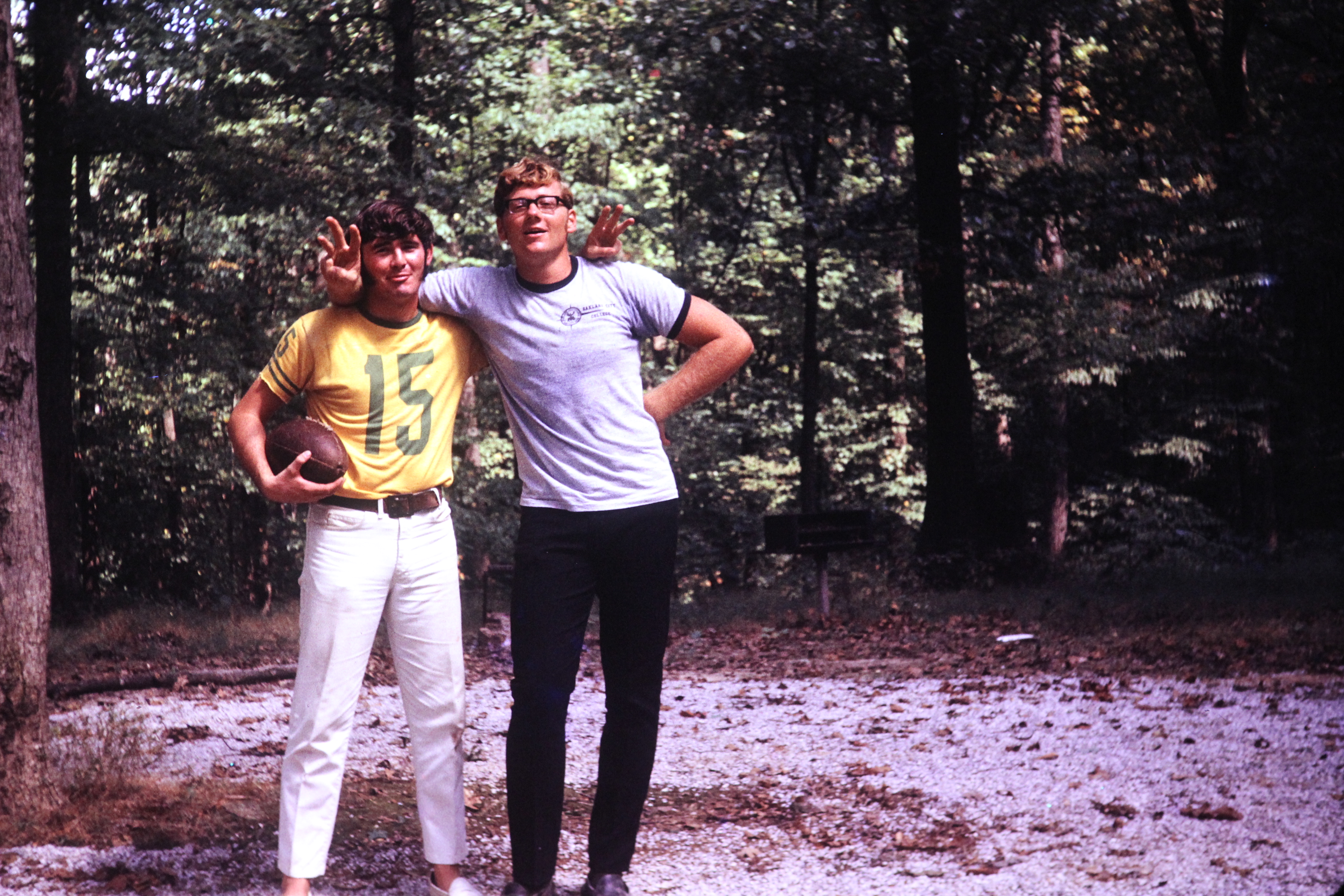
When I first enrolled at Oakland City College in the fall of 1969, Woodstock had just ended. So powerful were the vibes of the counterculture that its influence had reached, to some degree anyway, even OCC’s tiny and relatively remote campus. In October of my first semester the O. C. Collegian reported, for example, that several students would be participating in an on-campus national Moratorium protesting the Vietnam War. A student’s Collegian Christmas editorial in that same year captured some of the rhetoric of the Age of Aquarius, calling on OCC students to “help the needy all year . . . love our black neighbors . . . and . . . love our enemies [North Vietnam].”
Later, in the spring of that school year, the college leadership offered an “All-College Talk-Out.” At the same time a group of more aggressive students, wishing to have more input on campus issues and wanting to fire up the student body, formed a group called CONCERN, a rather odd and long-winded acronym for Committee of Neglected Crusaders Energetically Reforming Now.
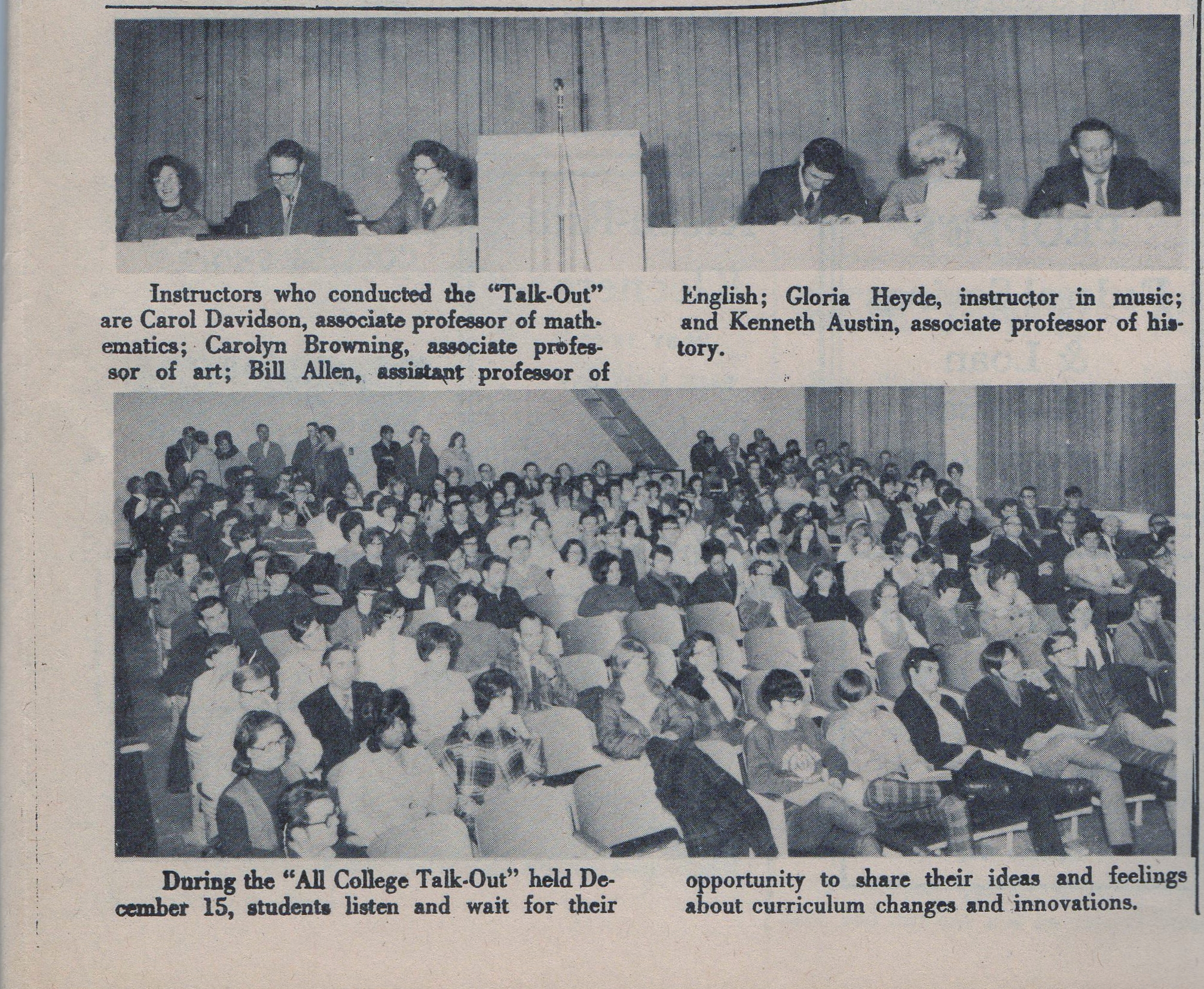
That same fall of ’69, as I left my rural home with a mixture of excitement and fear and trekked to Oakland City, I remained mostly naïve regarding the difficult questions being raised by many of the youth of my generation. My new dorm roommate was from Poplar Bluff, Missouri, a booming metropolis compared to where I grew up in rural southern Illinois.
Carl Runyon seemed more than a bit skeptical of life, a nice balance to my unbridled, rustic idealism. We quickly became close friends, staying up late into the night in our dorm quarters, Jordan Hall 306, talking endlessly of T. S. Elliott, of Sartre and Camus. During these intense discussions, Carl would often smoke a rank smelling cigar. Despite our exciting intellectual discoveries that year, our class photos in the school yearbook, the Mirror, revealed two freshman college students with boyish clean shaven faces and relatively short hair.
The lingering bit of counterculture attitude on the campus in the early seventies both attracted and scared me. OCC’s school newspaper, The O. C. C. Collegian, offered an ample variety of student-written articles that indicated the state of unrest at the school. Many Collegian student writers complained about rigid administrators, the great number of restrictive rules on campus, and the aggressive behavior of campus security.
One student wrote, regarding the latter,
“In the time span of one week, several humiliating events have occurred under the super direction of our campus lawmen.”
Another complained how campus security, “the OCC Gestapo,” had “struck again.” Typical of the times was the idealistic hope voiced by several of these youthful writers. One Collegian author boldly declared that “the scent of rebellion” at the college hung thickly “in the air.”
Carl Runyon, even though like me coming from a conservative background, seemed completely uninterested in the roles he was expected to play when he came to the college. By our second year at OCC, Carl had grown a scraggy dark beard and let his hair grow long. He became a member of the student judiciary court, a group who often locked horns with the administration. Carl even took a low grade on his capstone senior seminar paper rather than change what he believed to be essential points to please the professor.
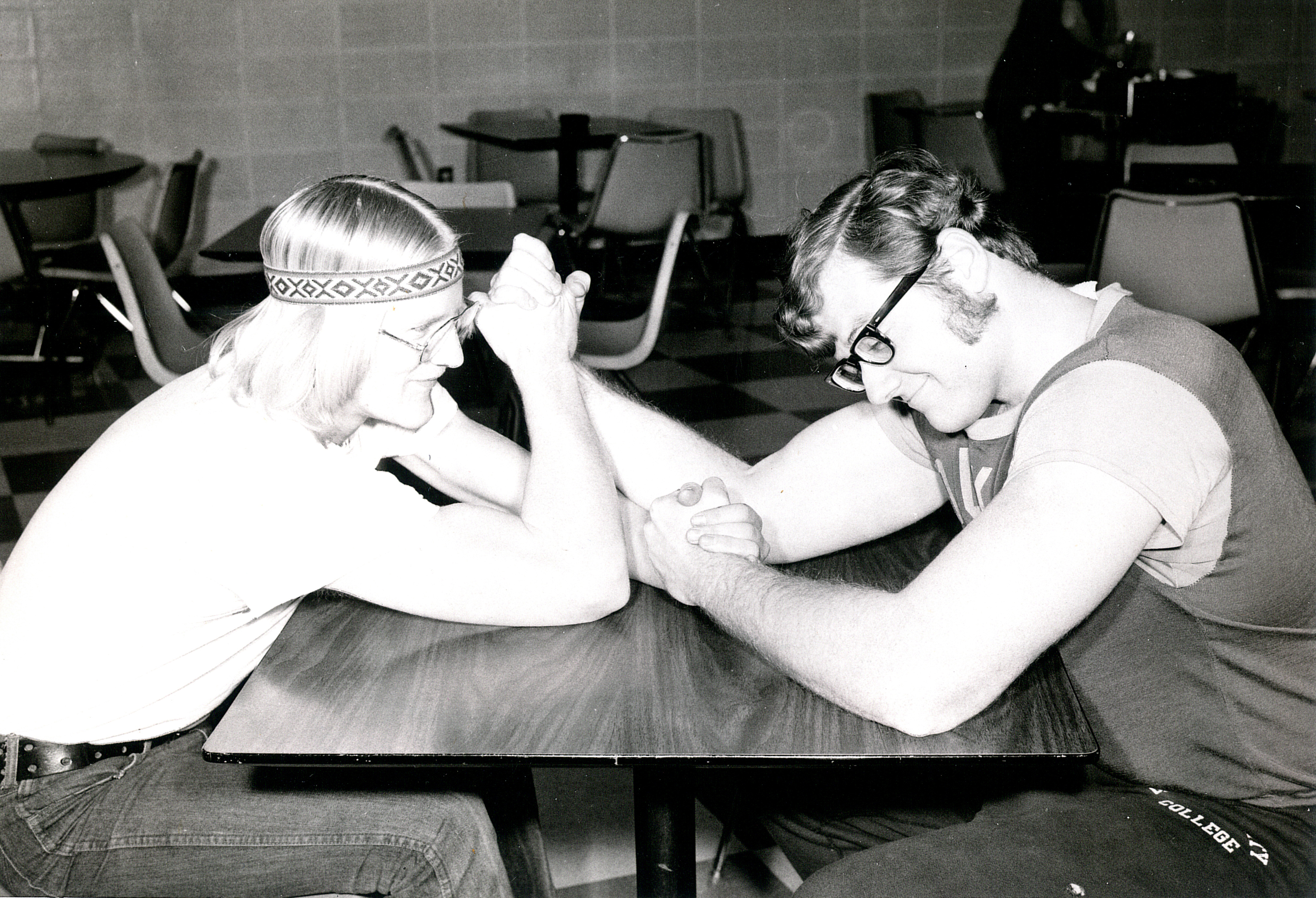
I admired my “roomie” greatly. He was not afraid to try on “new hats” while I trembled in the shadows of uncertainty and hid behind a wall of pseudo-intellectualism. In the fall of 1971, however, neither Carl’s new counterculture efforts nor my own naïve immersion in academic ponderings were enough to bring us complete contentment. OCC was in the middle of nowhere, and weekends there could be painfully dull.
Keep in mind, this was in the days when not every college student had a vehicle, and, as Diane Hampton so simply put it in an October ’71 Collegian article, “in order to bowl, see a movie, eat something other than cafeteria food, or shop at a discount store, one has to have a car.” Sunday afternoons were especially difficult. One desperately needed some type of non-academic activity to help make up for the long classroom sessions that always loomed in the coming week. Our hastily cobbled together football team came to answer that need.
OCC had supported a school football team throughout the 1920s and even on into the thirties, although the depression greatly limited the number of games played. During this stint, the college played teams such as Hanover, Indiana State, and then Evansville College, among other schools. World War II, however, took most of the male student population. The last official college game was played in 1942. Thus, there existed no tradition of football to guide any efforts to re-establish the sport.
By the fall of ’71, there were a number of intramural sports to help students pass the time and burn off excess energy, including flag football. The latter, however, lacked the pop and excitement of contact football. It was at this point my roommate, Carl Runyon, along with Joe Betz, and Tom Malin, conspired to plan that first game. A short article entitled, “Guys form grid team,” on the Collegian sports page announced the team’s birth.
At a lunch-time interview with Coach Joe Betz, it was quite obvious that football may be a coming sport on the OCC campus. Joe explained that OCC was challenged by Winslow Sunday, Sept. 12, at 1 p.m. as they became OCC’s first opponent since 1942.
The unofficial team met the challenge with nine men from Jordan Hall, plus one Dearing Hall man. OCC lost the flip and Winslow lost the game 42-0. New members of the unique team are:
Article from O.C.C. Collegian
- John “Hoss” Browder
- Carl “Butkus” Runyon
- Little Joe “Killer-Scrambler” Betz
- Mike “Defense” Sly
- Eddie “Quick” Collins
- Tom “The Passer” Malin
- Bruce “Touchdown” Sebert
- Rick “Dynamite” Calamba
- Larry “Dearing Hall” Prusheci
- Tom “The Hiker” Beach
When the team played games in Oakland City, players, dressed in torn jeans and sweatshirts, hurried to the local high school and performed on the Wood Memorial football field. We played on Sunday afternoons. This is why, I suppose, no one ever came to the high school field and said we couldn’t play contact football there, especially without equipment.
By the second game, word had gotten around about the team, and a number of male students with nothing else to do on a Sunday afternoon and wishing perhaps to remember their glory days, asked to play. I was not in that first game, but Carl recruited me for the next contest. I had never played football before, but since my sophomore year at OCC I had dedicated myself to weightlifting. I suppose Carl figured if I could throw all that weight around in the weight room, I could move bodies pretty well on a football field.
My roommate had played on a Poplar Bluff, Missouri, state championship football team. Carl was not especially big or strong in body but was amazingly single minded in spirit. His senior year he had been a tri-captain for the Poplar Bluff Mules, homage perhaps to his character rather than to his physical abilities. He was also an excellent teacher regarding the tasks of a lineman, and I greatly enjoyed learning about the game from him.
By the OCC team’s second contest, a few fans were beginning to show up. The Collegian reported this second game under the headline, “Grid Squad Wins Again.” The piece noted the team was still “unsupported” by the school population but still thumped “ISUE, 26-0.” Touchdowns were scored “by Carl Runyon, Scott Slater, and Mike Scaggs. Tom Malin’s conversion contributed two extra points and interceptions were accredited to Scaggs, Joe Betz, and Tom Kent.”
The next game was scheduled “against Holland at the local field.”By the third game a number of outstanding players and several good overall athletes were part of the roster. The list included Carl Runyon, of course, and Tom Malin, holder of the Michigan prep punting record. Tom attended the University of Michigan on a football scholarship until an injury caused him to transfer to OCC. He could still kick the daylights out of a football.
Then there was little Adrian Lee who ran for the OCC track team and held a state record in the 60 yard dash. Once he got his hands on the ball, he looked as if he’d been shot out of a cannon.
We also had an all state honorable mention quarterback. Many other players had been on highly successful high school teams and were solid hard nosed athletes. Perhaps one of the more colorful players was “lil” Joe Betz from Wheeler, Indiana. Joe ran cross country for the Mighty Oaks. Hardly five feet five, he played football the way he lived his life at the college, with a lot of on the edge gusto.
Our ongoing efforts brought forth some surprising attention, especially from female students. We suddenly found ourselves with a fairly large following who lined the field wherever we played. Larry Davis, a lineman for our team from Pekin, Illinois, remembered
there was even talk of having a homecoming game, complete with the crowning of a queen.
A Collegian reporter, Margie Schneider, wrote a long piece on both the three “tri-captains” and the entire team. “Dashing across the goal line this week for the touchdown,” she wrote in the first account, “were tri-captains of the newly formed unsupported football team of OCC, Carl Runyon, Tom Malin and Joe Betz.” An accompanying photo showed Carl, Tom Malin, and “lil” Joe in a football stance.
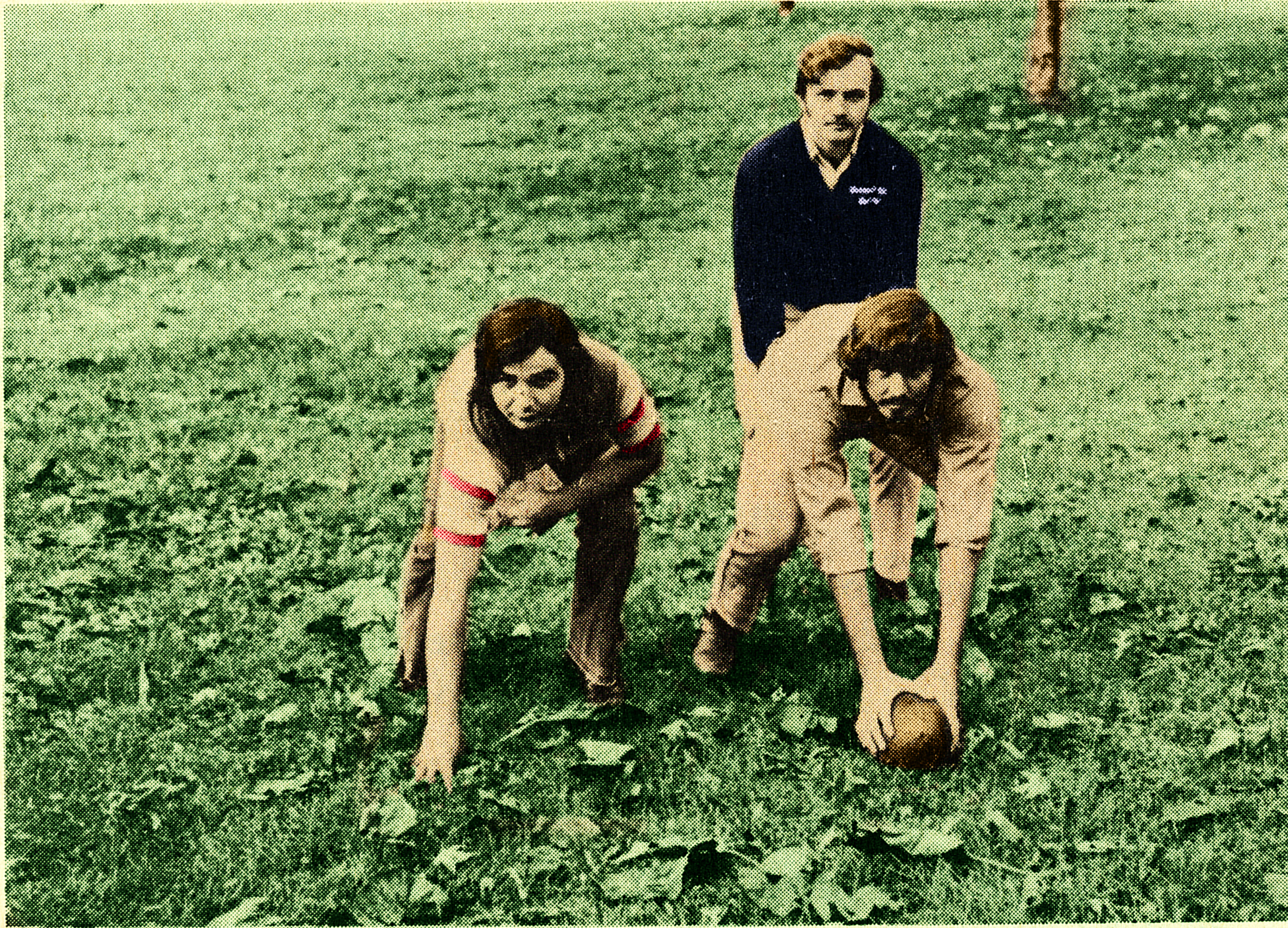
The piece ended by encouraging students to take in the team’s next game. “Sunday’s the day, three o’clock is the time, and Wood High School football field is the place. Come and see them and the twenty-five other members as they take on the ISUE Eagles in their homestead.”
Toward the end of our season, the crowds were fairly large and the hits more ferocious. There were some broken bones, and one fellow, I remember, fractured a vertebra. My Jordan Hall roommate, Carl Runyon, recalls, “Of course, the school really emphasized the flag-football intramural games the next year because several guys were seriously injured while we were playing tackle without pads. I can’t remember his name, but one guy cracked a vertebra in his back and at least one—I think more—had serious knee injuries.”
Carl played with great intensity and focus, and with a bit of cynicism I think that pushed him to hit even harder than he might have. Sometimes Carl’s fierce hits came at a price. One of my few exact memories of those games was Carl being knocked out cold with a concussion. He came to, not knowing who he was or where he was, just that he was in a football game. He’d get in the huddle and ask frantically whose side he was on and who he should hit. At the time we thought it was hilarious. Carl recently emailed with his recollections of that day.
As for the results of the concussion, I can remember everything that day up until Denny Lewis and I met head first at the line of scrimmage (sans helmets). I was knocked out on my feet for a few minutes (maybe seconds) but I vaguely remember asking in the huddle, “Where am I supposed to go?” and you guys would lead me to my spot for the upcoming play.
I think that when you or someone else realized I was dinged and suggested that I should let someone come in to replace me, Joey Betz said something to the effect of “Hell, no, let him stand on one side and they won’t run that direction, so the rest of us can expect them to run the other direction and be ready for them.” I didn’t play long after that before I went to the Oaks to get a bag of ice and then back to the room to lie down, all of which I remember as well as I can remember anything from 37-38 years ago — or even 5 minutes ago.
Carl also remembered that the game was perhaps our “team’s” first and was played down at the “swamp,” the college playing field next to Highway 57. “The game wasn’t one of the intramural contests,” Carl recalled, “because we were playing tackle, not flag football. It was one of the ‘team’ games, but I think it was early on when our Jordan Hall group took on the other men’s dorm.”
Just before our last game, the Collegian did a nice write-up on the team entitled “Enthusiastic Grid Team Undefeated.” The beginning of the article recapped some history. “Garbed in ripped T-shirts and scrubbys, several students decided the College needed a football team to back on ‘Nothing to do’ Sunday afternoons.
In answer to their quest a handful of guys and a cupful of gals turned out to play another unorganized team. The game was a success as OCC defeated Winslow in a shut-out, 42-0.” The writer went on to note, “Since that time the handful of guys has grown to twenty-five and the cupful of gals is now a roaring crowd.”
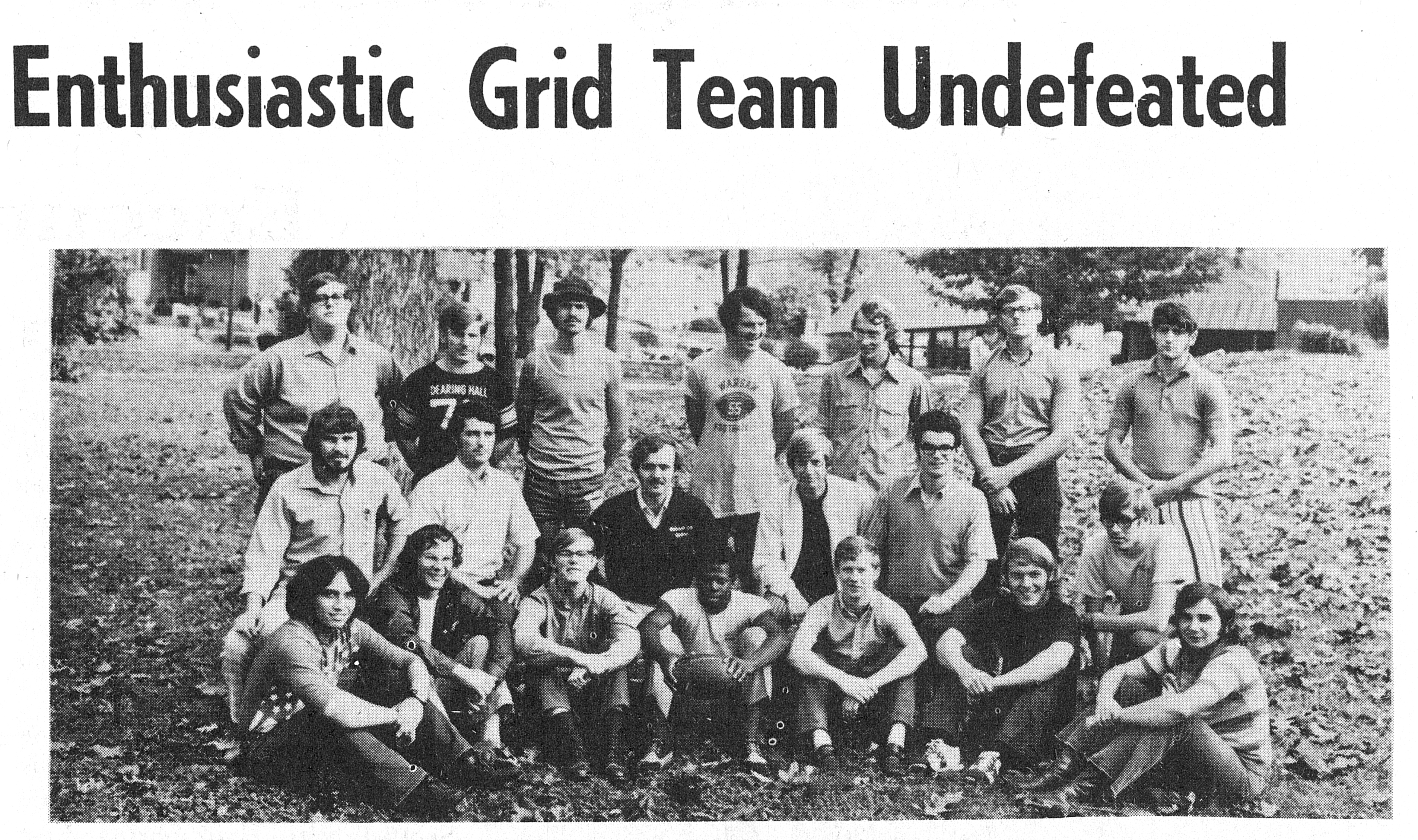
Although not an official roster, the article carried a photo and listed the following members:
- Carl Runyon
- Tom Malin
- Joe Betz
- Tri-captain- Mike Scaggs
- Tri-captain- Don Lusk
- Tri-captain- Tom Beach
- Tony Eskew
- Steve Tippen
- John “Hoss” Browder
- Eddie Collins
- Richard Calamba
- Adrian Lee
- Mike Lushall
- Dale Williams
- Scot Slatter
- Steve Russell
- Tony Nolan
- Kenny “B.R.” Howe
- Stan Hale
- Denny Thompson
- Larry Davis
- Randy Mills
- Bruce Sebert
- Tom Schirr
- Steve Benjamin.
There was never an official roster kept of the team. Looking at the Collegian photo, and having read the Collegian articles about the team, I would add to that list the names of Lee Borum, Steve Fleenor, Steve Walker, Mike Sly, and Steve Prusheci. Memory is often the first casualty of aging. Thus, there were likely a few others who played that I have missed.
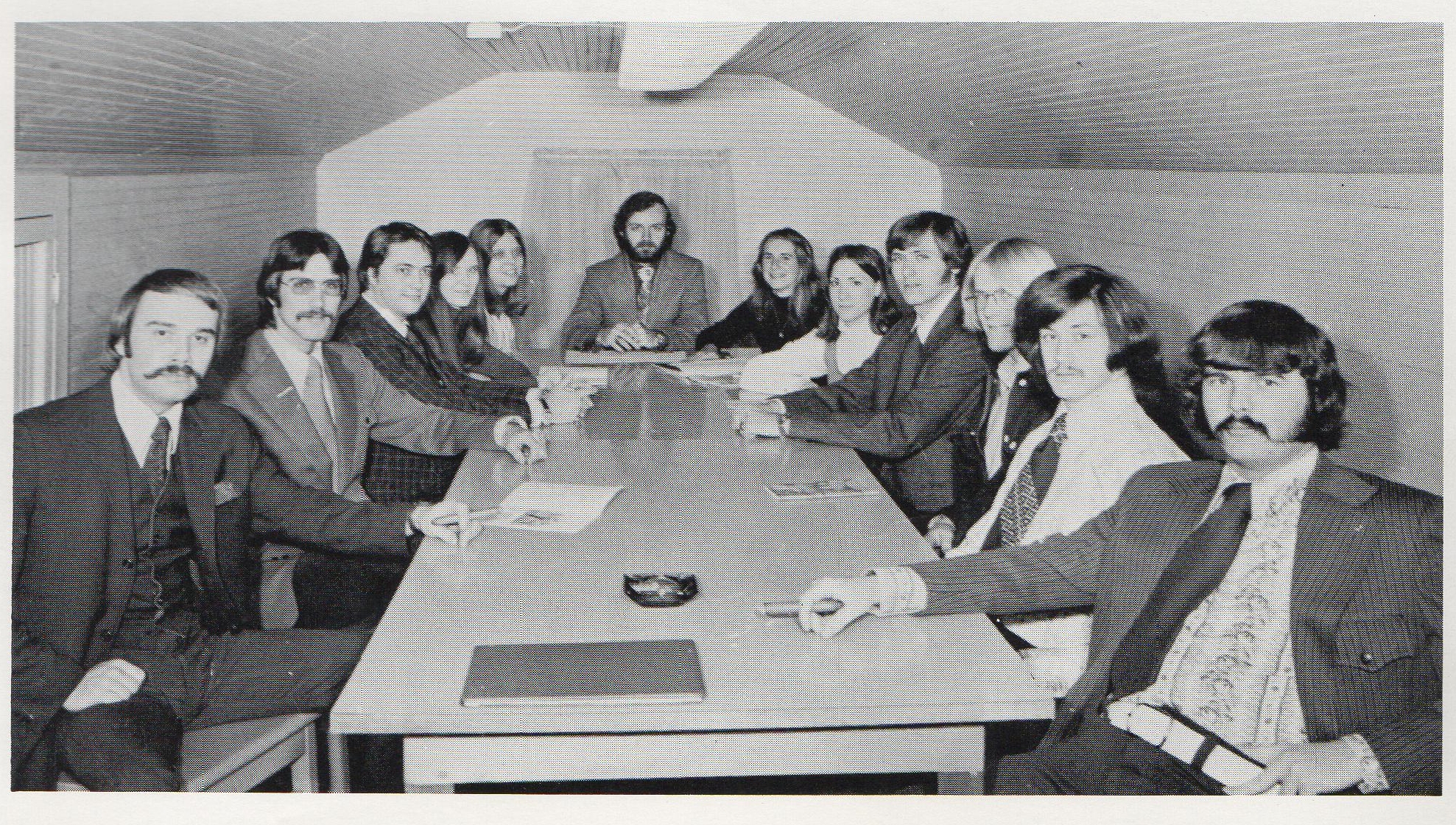
It has been almost forty years since the fall that Oakland City College, now Oakland City University, fielded an unofficial football team. I can imagine my ole skeptical roomie, Carl Runyon, smoking one of his cigars back in Jordan Hall 306, telling me not to spin any too idealistic memories out of a rather mild event. “After all roomie,” Carl would probably say, “it was just a football game.”
Occasionally, however, I still think of those times, the purity of our hopes and dreams and the seemingly endless road of possibilities that once unfolded before us. Perhaps the last line of Margie Schneider’s article back in 1971 sums up so well the innocent and unfounded confidence of our youth: “Each game the team displays record breaking scores and reckless abandon.”